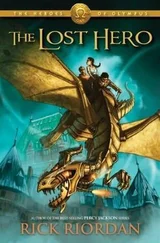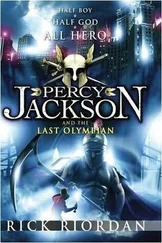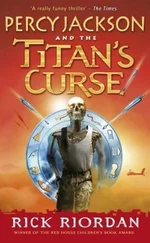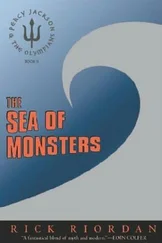You got it. They shop.
Unlike the side trip to Aunty Em’s, where he was pretty certain he could smell trouble coming, this time Grover’s the one who lets the trio down. He develops a sudden, potentially fatal attraction to the waterbeds. Almost before the trio knows what’s happening, Grover’s tied to one of the beds, with Annabeth not far behind. Both are in definite danger of being stretched to one size fits all .
Unless Percy thinks on his feet pretty darned fast, not only will he fail in his quest, but he and the others are going to be extremely uncomfortable—though admittedly more likely to be picked first for basketball.
Fortunately, by the time chapter seventeen has rolled around, thinking on his feet is a thing at which Perseus Jackson is learning to excel.
He turns the tables on waterbed salesman Crusty, short for Procrustes, a.k.a. the Stretcher, a real kill-’em-with-kindness guy. Percy does this by convincing Crusty that those waterbeds look pretty good, so good that Crusty himself ought to try one on for size. The moment Crusty does this, Percy’s in the clear. He dispatches the monster and rescues his friends.
The shopping trip is over. The quest is on.
But I’ve still got a question, and my guess is you do too: Why in Western Civilization didn’t Percy walk in then walk right back out the Waterbed Palace door? As soon as the thugs had departed, of course. Fast as our hero thinks on his feet when the time comes, why does it take the time so long to arrive? Why didn’t Percy spot that there was something weird going on right off the bat?
I mean, come on.
A guy that Percy himself describes as looking like a raptor in a leisure suit tries to sell three individuals clearly not old enough to have their own credit cards some waterbeds? Get real. Do you have any idea how expensive those things are? And I’m talking before the shipping and handling costs. No salesman is that desperate. No real one, anyhow.
It’s Aunty Em’s Garden Gnome Emporium all over again, when you get right down to it. Our friends end up walking right into a trap. But the thing that lures them into the trap in the first place is a front. Specifically, a store front.
So just what is it about monsters and retail? Why would monsters even pick retail in the first place? Why go to all the effort of trying to lure Percy and his friends in to shop, when it would be so much easier to simply jump out from behind the nearest available cover and wipe them out? Percy and his pals only add up to three, after all.
At least they do in The Lightning Thief . Our hero does get some reinforcements as his adventure moves along. Even so, monsters come in an infinite variety of shapes and sizes, not to mention numbers. Surely all they’d have to do would be to keep on coming. Sooner or later, and probably sooner, Percy and his pals are bound to get tired.
And here’s another question for you: If the monsters are going to go to all the trouble of setting up the opportunity for retail, how come they never seem to be selling anything a young demigod might actually want? Like some super new weapon, the ability to shop for your heart’s desire, or to travel through time.
It took me a while, but I think I’ve come up with an explanation.
The fact that the monsters aren’t selling anything our hero and his companions really, truly want is part of the point. I’m talking about the author’s point, now. And Percy not being able to spot the danger monster retail poses, at least not immediately, is the other part. Because the truth (which I put forward knowing full well that I run the risk of pissing off any monster within earshot) is actually quite radical.
All those retail monsters Percy encounters are actually doing him a favor, whether they mean to or not.
And just what is that favor, you’d like to know? They’re teaching Percy about caveat emptor .
You know what that is, of course.
It’s Latin for “let the buyer beware.” And if that doesn’t apply to Percy and pals I don’t know what does. Essentially what it means for them, or for any demigod and his or her quest companions, is that they need to keep their eyes open. I’m not just talking about when it comes to monster retail opportunities. I’m talking all the time.
Because when you get right down to it, almost everybody Percy meets, good or bad, has the potential to be hiding something. Half the time, it’s who they really are. The other half, it’s what they really want. And that’s not even counting the Mist, which can enable citizens of the realm of gods and monsters to screen themselves from mortal eyes entirely, or at the very least change their forms.
Not that a character has to use the Mist to hide what they really are, of course. The most important character in the series who looks like one thing but turns out to be another is one who never uses the Mist at all. He doesn’t even change shape. Not really. He simply hides his true colors until the time is right to reveal himself.
You know who I’m talking about, don’t you? It’s Luke, of course.
Luke, who starts out being the person Percy looks up to as a friend, then metamorphoses into an archenemy determined to bring down the gods at all costs. And he does all this without changing so much as a hair on his head.
By now, I’ll bet you’re beginning to see my point.
Almost nobody in Percy’s world is what they originally appear to be, including, as it turns out, Percy himself. And if he’s going to survive in this world he’s suddenly discovered he’s a very important part of, he’s going to have to use more than his wits. He’s going to have to use his eyes. What’s the best way of learning to do that?
You got it. By discovering how often you just can’t trust them.
That’s what monster retail is really all about. It’s about learning to see the difference between truth and illusion. Developing the ability to see what’s really there and what is not. And as Percy’s experience at Aunty Em’s Garden Gnome Emporium goes to show, there’s no such thing as a real bargain when you indulge in monster retail, not to mention no such thing as a free lunch.
But the thing that really makes the theory work for me is the way that Percy himself begins to catch on. He even says as much, sort of, right before he makes the stupendous mistake of stepping through the front doors of the Lotus Hotel and Casino. Why does he do this, apart from the fact that it seems like a good idea at the time?
He does it because even he admits he’s learned to be suspicious. Learned to be prepared for the fact that almost anything he encounters could be either a monster or a god. But the doorman in front of the Lotus is clearly human, clearly normal. Now that Percy knows how important it is to look for stuff like this, he’s able to spot it right off.
Not only that, the doorman is a sympathetic human, and his sympathy strikes just the right note to encourage Percy to walk through the casino doors. This turns out to be about the worst mistake he could have made and comes perilously close to derailing the entire quest.
This is seriously sneaky stuff. Why? Because the Lotus turns the tables on Percy. His decision to enter the Hotel and Casino in the first place rests on the fact that he’s learning his lesson, learning not to trust his eyes. But who’s been teaching him this? The monsters, that’s who. With a little help from the people Percy actually trusts thrown in on the side.
When you look at it this way, it doesn’t seem so far-fetched to suggest that all those retail monsters are actually doing Percy a favor. You might even be able to claim that, in a roundabout sort of way, all those monsters are really on Percy’s side.
Читать дальше











